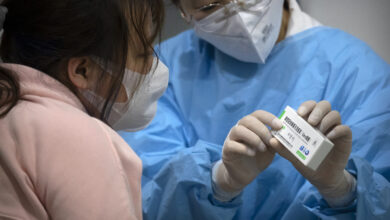Symptoms of an Infection vs. Inflammatory Breast Cancer

[ad_1]
Most of us know that if we notice a lump in our breast, we need to get examined by a doctor in case it’s cancerous. But it turns out we should also be on the lookout for a rash on the breast. That’s because an estimated 1 to 6% of all breast cancers are inflammatory, meaning they show up with signs of inflammation — a breast cancer rash.
What is a breast cancer rash?
“What can happen is the breast can turn red, hot and inflamed,” explains Sara Hurvitz, M.D., professor of medicine and director of the Breast Cancer Clinical Trials Program at the David Geffen School of Medicine at UCLA. “The skin can get thick and have the appearance of like an orange peel. Even if there’s no mass, it can look like an infection. It’s typically painful, not itchy.” The problem is it can be hard to tell if skin irritation is the result of an infection or an indication that something more serious is at play.
“I think most times that when you see this, the common suspicion is either what we call mastitis, which is an infection of the breast which happens more in a younger population, or some kind of dermatitis, which means that it is a simple rash by some kind of allergic reaction,” says Naoto Ueno, M.D., Ph.D., executive director of the Morgan Welch Inflammatory Breast Cancer Research Program and Clinic at MD Anderson Cancer Center in Houston.
To help keep yourself armed with knowledge, we’re breaking down the symptoms of an infection as well inflammatory breast cancer.
Symptoms of a breast infection
Mastitis tends to occur in women who are breastfeeding, although other women and even men can experience it on occasion. It typically happens when bacteria enters a milk duct or a milk duct gets clogged. It is usually resolved with antibiotics.
Here are the most common signs of a breast infection, according to the Mayo Clinic:
- Swelling
- Redness
- Tenderness
- Skin thickening
- Breast lump
- Pain or burning sensation
- Feeling sick
- Fever
Symptoms of inflammatory breast cancer
Unlike a breast infection, which primarily affects breastfeeding women, inflammatory breast cancer can afflict anyone (although it’s more common among African American women than white women). It also requires a much different treatment protocol. “Inflammatory breast cancer doesn’t get better with antibiotics, in general, and really does need to be diagnosed with a biopsy of the skin,” says Dr. Hurvitz.
That said, here are some signs to look out for, according to the National Cancer Institute:
- Swelling
- Redness
- Bruising
- Tenderness
- Skin thickening
- Pitting (like an orange peel)
- Breast lump
- Pain or burning sensation
- Rapid increase in breast size
- Inverted nipple
- Swollen lymph nodes
Diagnosing a rash on the breast
Typically, the first thing a doctor will do is prescribe antibiotics for an infection or steroids for dermatitis. “However, there are cases when people will not improve and it will be persistent and will continue to spread,” says Dr. Ueno. “When you see that kind of progression or it’s not responding to treatment or the breast is truly swollen, then you do have to keep in mind that this could be a breast cancer.” At that point, your doctor may recommend an ultrasound, MRI or mammogram to provide images of what’s happening beneath the skin. “Sometimes the mammogram won’t show anything particularly abnormal except maybe skin thickening, so it’s really important to get to a breast surgeon or a surgeon who can perform a punch biopsy of the skin and that will be able to diagnose what’s going on,” adds Dr. Hurvitz.
When it comes to inflammatory breast cancer, quick action is necessary. “Inflammatory breast cancer happens almost overnight,” says Dr. Hurvitz. “A patient has a normal breast on Monday, and on Wednesday it’s red and by Friday it’s hot.” Unlike a lump that may slowly grow over months, inflammatory breast cancer can be aggressive and develop in a matter of days or weeks. On top of that, any type of breast cancer can become inflammatory. That means whether a person’s breast cancer is HER2-positive or triple-negative (terms that tell us what therapy they might respond best to), it can present with an inflammatory rash. “The reason the breast becomes red and hot is the breast cancer cells are clogging the little lymphatic vessels that drain the skin and so they get clogged up and that turns the breast red and hot and inflamed,” explains Dr. Hurvitz.
What can you do?
This is yet another example of how critical it is to advocate for your health. If you’re prescribed a treatment for a rash on your breast, make sure you follow up with your doctor to let them know whether or not it healed and discuss the next steps. Don’t be afraid to mention the possibility of inflammatory breast cancer. “There are physicians that forget about this diagnosis and they keep repeating a second round of antibiotics, then a third round of antibiotics — and that gets in the way of diagnosis,” says Dr. Ueno. “So, if you have multiple treatments and it’s not improving, it’s important to get a second opinion to do a biopsy or to perform imaging.”
In the meantime, you should also perform a monthly breast self-exam so that you can immediately spot any of the changes listed above. “It may be harder to pick up redness if a person has darker skin tone, but you can compare the two breasts and one would appear darker than the other,” says Dr. Hurvitz. “Sometimes one breast is bigger than the other so that sort of asymmetry is an important clue.” Essentially, if you notice anything abnormal, schedule an appointment with your doctor, and if they dismiss your concerns, find another one. “I tell all my patients to listen to your body and if something doesn’t feel right, and you’re not getting the attention you feel you need, there are a lot of doctors out there so get yourself a second opinion,” says Dr. Hurvitz.
This content is created and maintained by a third party, and imported onto this page to help users provide their email addresses. You may be able to find more information about this and similar content at piano.io
[ad_2]
Source link





